Demolition Contractors Denver
Find top Demolition Contractors Near Me in Denver
Receive 3 FREE Structure Demolition quotes for your project today! Compare profiles, reviews, accreditations, portfolio, etc... and choose the best service.
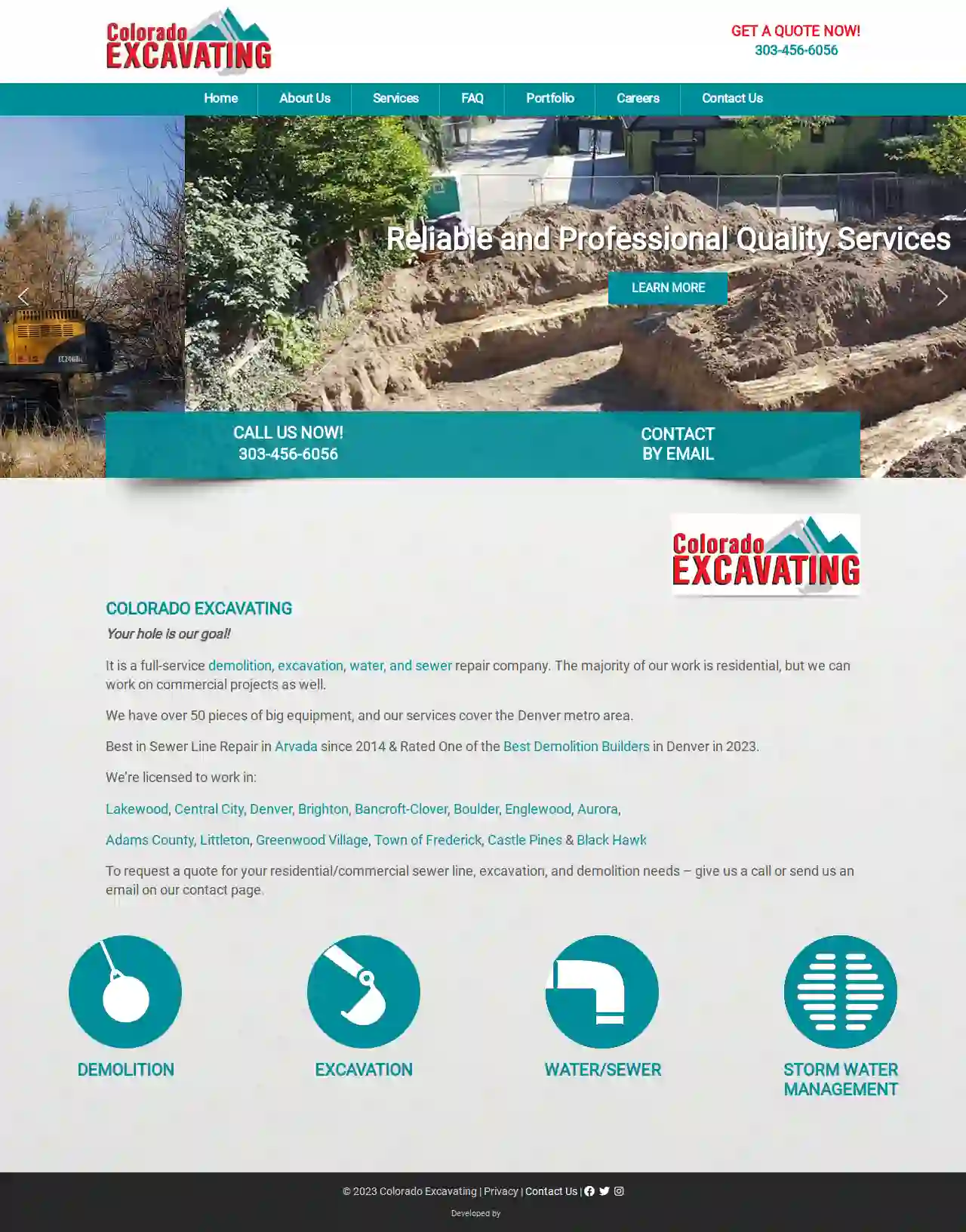
Colorado Excavating
4.332 reviewsDenver, USColorado Excavating: Your Hole is Our Goal! Colorado Excavating is a full-service demolition, excavation, water, and sewer repair company. We primarily serve residential clients, but we also handle commercial projects. With over 50 pieces of heavy equipment, we provide services throughout the Denver metro area. We've earned a reputation for excellence, being recognized as one of the best demolition builders in Denver in 2023 and the top choice for sewer line repair in Arvada since 2014. Our licensed service areas include: Lakewood Central City Denver Brighton Bancroft-Clover Boulder Englewood Aurora Adams County Littleton Greenwood Village Town of Frederick Castle Pines Black Hawk For all your residential and commercial sewer line, excavation, and demolition needs, contact us for a free quote. You can reach us by phone or email through our contact page.
- Services
- Why Us?
- Gallery
Get Quote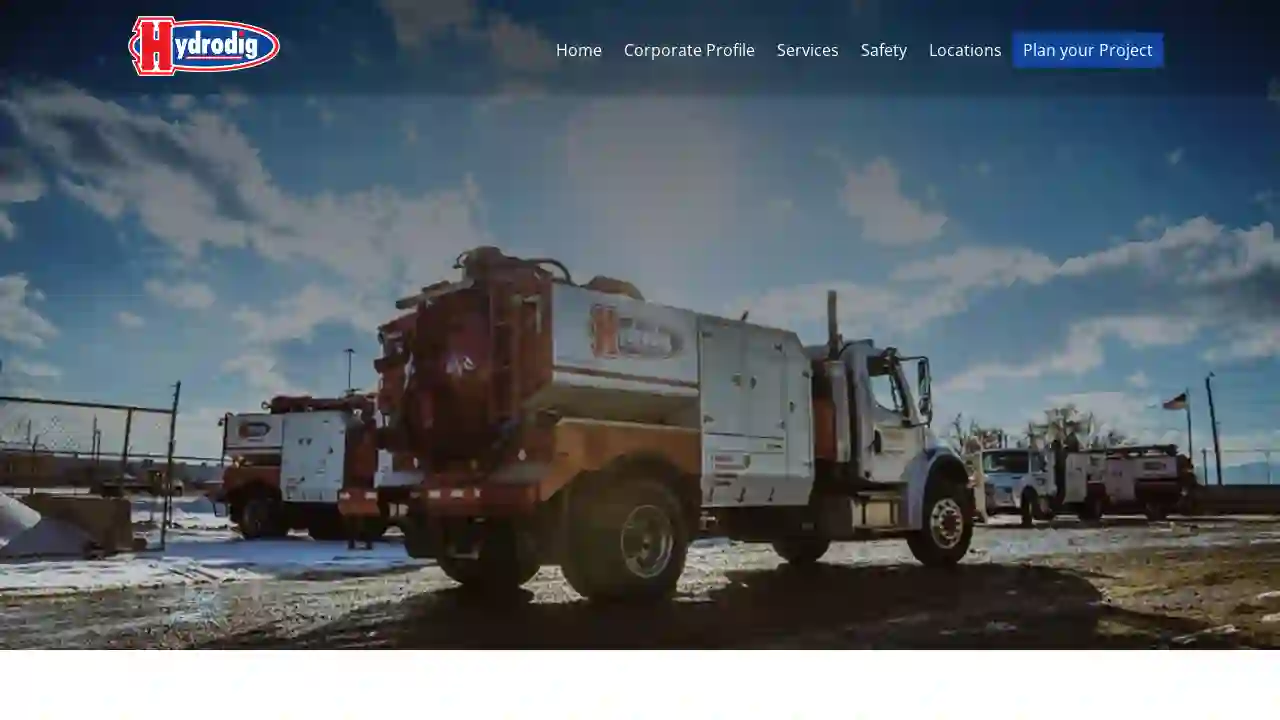
Hydrodig of Denver
4.418 reviews4410 50 St., Bentley, T0C 0J0, USWho is Hydrodig? Incorporated in 1997 and commencing hydro-excavating activities in the spring of 1998, Hydrodig™ has become one of North America’s leading hydrovac companies with Canadian service locations in British Columbia, Alberta, Saskatchewan and Ontario as well as with USA locations in Denver, CO and Dallas, TX. Hydrodig™ undertook initial Western Canada expansion in 2000 with the creation of an owner / operator network of hydrovac service providers. In 2009, Hydrodig™ created its first international entity, Hydrodig™ USA LLC. With locations from Vancouver BC to Ottawa ON and the exposure in the USA, Hydrodig™ can provide safe, efficient, and cost effective solutions to any excavation project with our unique single axle, 4×4 hydro-excavating units. What Is Hydro-Excavation? Numerous terms are associated with this activity: potholing, daylighting, hydro-trenching, hydrovacing and non-destructive excavating to name a few. What is Hydro-Excavation? Simply put, hydro-excavation is the process of utilizing high-pressure water and a powerful vacuum system to excavate. A high pressure water stream loosens the earth and other debris while simultaneously removing and storing the slurry within the onboard vacuum system. This precision orientated activity is predominately used to expose underground infrastructure while determining/proving its precise location OR its non-existence within a proposed excavation area. What is Hydro-Excavation? All in a safe, non-destructive fashion. Examples of underground infrastructure include oil and gas pipelines, water pipelines, sewer pipelines, fiber optic cables, electrical cables, and other utilities.
- Services
- Why Us?
- Gallery
Get Quote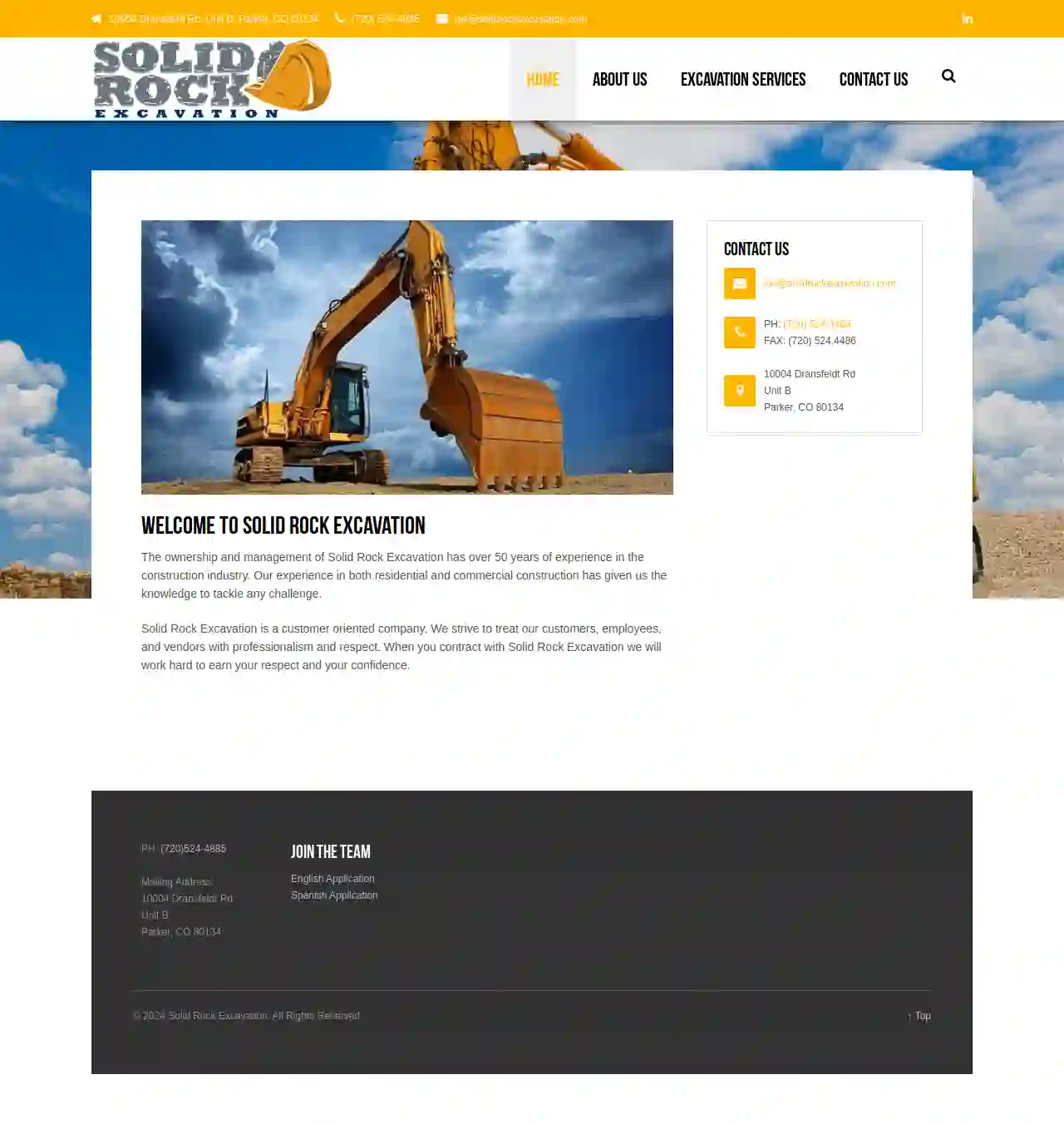
Solid Rock Excavation
54 reviews10004 Dransfeldt Rd, Unit B, Parker, 80134, USSolid Rock Excavation: Building on a Foundation of Experience and Integrity Solid Rock Excavation is a customer-oriented company with a rich history in the construction industry. Founded by Joe Chupp, who boasts over 50 years of experience in both residential and commercial construction, Solid Rock brings a wealth of knowledge and expertise to every project. Joe's dedication to quality, integrity, and honesty is reflected in every aspect of the company's operations. At Solid Rock, we believe in building strong relationships with our customers, employees, and vendors. We strive to treat everyone with professionalism and respect, earning your trust and confidence with every interaction. Our commitment to safety and a positive work environment ensures that our team is well-equipped to handle any challenge. Joe's journey with Solid Rock began in 2009, where he held various roles, including operator, Project Manager, and VP of Operations. His dedication and leadership led him to become the owner of Solid Rock Excavation in 2020. This deep understanding of the industry, coupled with his commitment to excellence, makes Solid Rock Excavation the ideal partner for your construction needs.
- Services
- Why Us?
- Our Team
- Gallery
Get Quote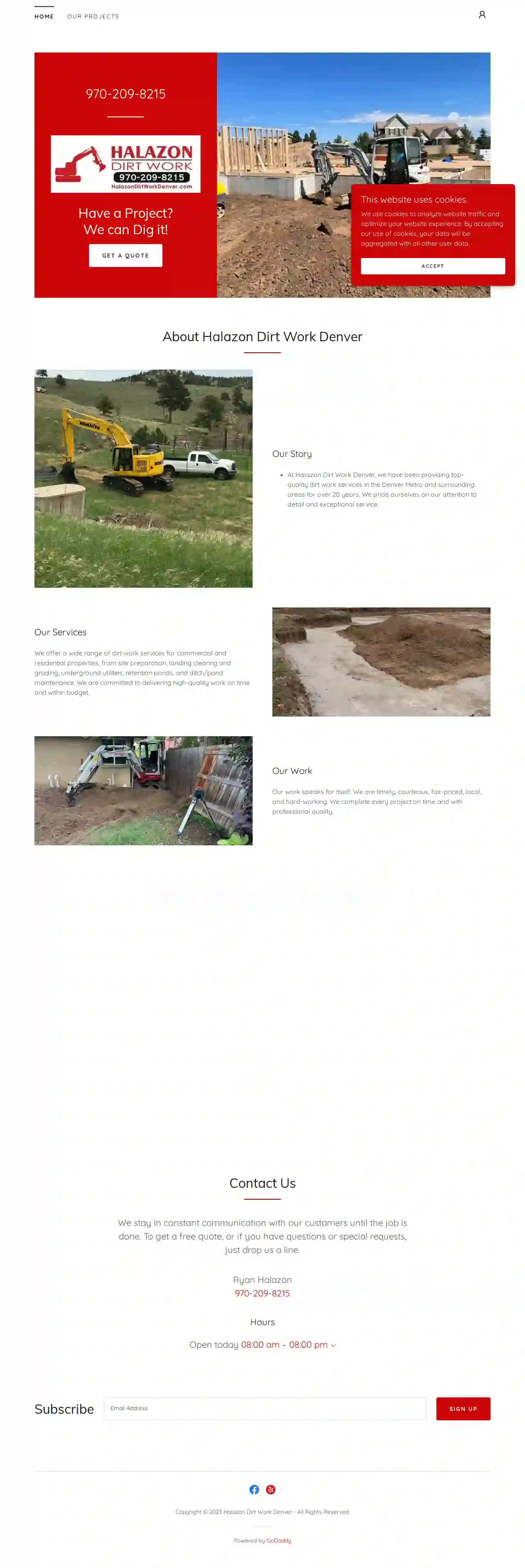
Halazon Dirt Work Denver
53 reviewsDenver, US- Services
- Why Us?
Get Quote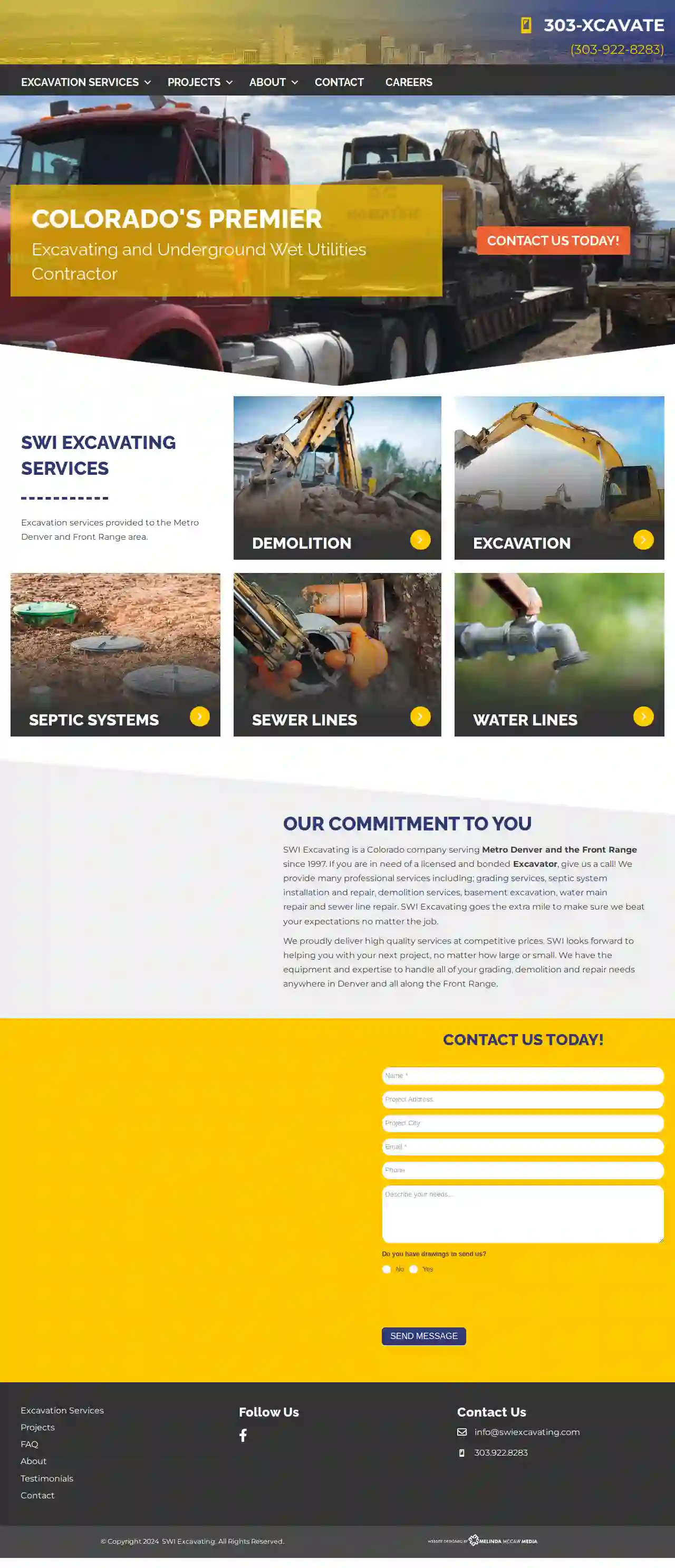
SWI Excavating
4.724 reviewsDenver, US- Services
- Why Us?
Get Quote
Over 3,943+ Excavation Pros in our network
Our excavation pros operate in Denver & surroundings!
ExcavationHQ has curated and vetted the Best Excavation Businesses in Denver. Find the most reliable contractor today.
Frequently Asked Questions About Demolition Contractors
- Permits and Regulations: Obtain all necessary demolition permits and comply with local building codes and environmental regulations.
- Contracts: Have a clear and comprehensive contract with the demolition contractor outlining the scope of work, payment terms, and liabilities.
- Environmental Laws: Comply with environmental laws regarding hazardous material removal, waste disposal, and pollution control.
- Neighboring Property Rights: Respect neighboring property rights and take measures to prevent damage or disruption to adjacent properties.
- Worker Safety: Adhere to worker safety regulations and provide a safe working environment for demolition crews.
- Project Assessment: The demolition contractor evaluates the structure, site conditions, and project requirements.
- Permitting: Obtain necessary demolition permits from local authorities.
- Site Preparation: Secure the site, disconnect utilities, and remove any valuable or reusable items.
- Hazardous Material Abatement: Professionally remove asbestos, lead paint, or other hazardous materials if present.
- Demolition: Execute the chosen demolition method, bringing down the structure safely and efficiently.
- Debris Removal and Site Cleanup: Sort, process, and dispose of demolition debris responsibly. Clean up the site to prepare it for future use.
What are the legal considerations for demolition projects?
Do I need a permit for demolition?
What are the steps involved in a typical demolition process?
What is the difference between demolition and deconstruction?
Demolition: Typically involves bringing down a structure quickly and efficiently, often using heavy machinery and potentially explosives. The primary goal is to clear the site.
Deconstruction: Focuses on carefully dismantling a building piece by piece to salvage reusable materials. It prioritizes minimizing waste and environmental impact, often involving manual labor and specialized tools.
The choice between demolition and deconstruction depends on the project's objectives, budget, and environmental considerations.
What are the legal considerations for demolition projects?
- Permits and Regulations: Obtain all necessary demolition permits and comply with local building codes and environmental regulations.
- Contracts: Have a clear and comprehensive contract with the demolition contractor outlining the scope of work, payment terms, and liabilities.
- Environmental Laws: Comply with environmental laws regarding hazardous material removal, waste disposal, and pollution control.
- Neighboring Property Rights: Respect neighboring property rights and take measures to prevent damage or disruption to adjacent properties.
- Worker Safety: Adhere to worker safety regulations and provide a safe working environment for demolition crews.
Do I need a permit for demolition?
What are the steps involved in a typical demolition process?
- Project Assessment: The demolition contractor evaluates the structure, site conditions, and project requirements.
- Permitting: Obtain necessary demolition permits from local authorities.
- Site Preparation: Secure the site, disconnect utilities, and remove any valuable or reusable items.
- Hazardous Material Abatement: Professionally remove asbestos, lead paint, or other hazardous materials if present.
- Demolition: Execute the chosen demolition method, bringing down the structure safely and efficiently.
- Debris Removal and Site Cleanup: Sort, process, and dispose of demolition debris responsibly. Clean up the site to prepare it for future use.
What is the difference between demolition and deconstruction?
Demolition: Typically involves bringing down a structure quickly and efficiently, often using heavy machinery and potentially explosives. The primary goal is to clear the site.
Deconstruction: Focuses on carefully dismantling a building piece by piece to salvage reusable materials. It prioritizes minimizing waste and environmental impact, often involving manual labor and specialized tools.
The choice between demolition and deconstruction depends on the project's objectives, budget, and environmental considerations.